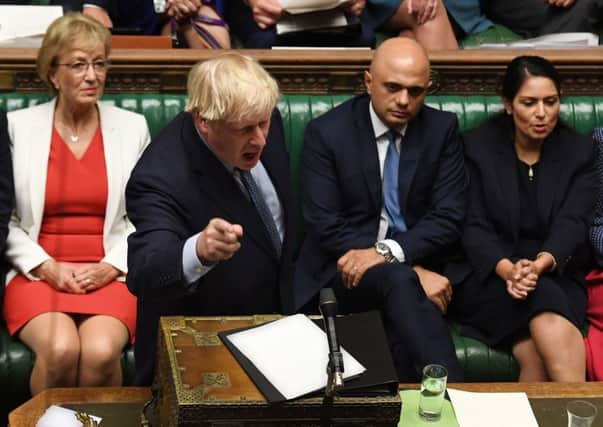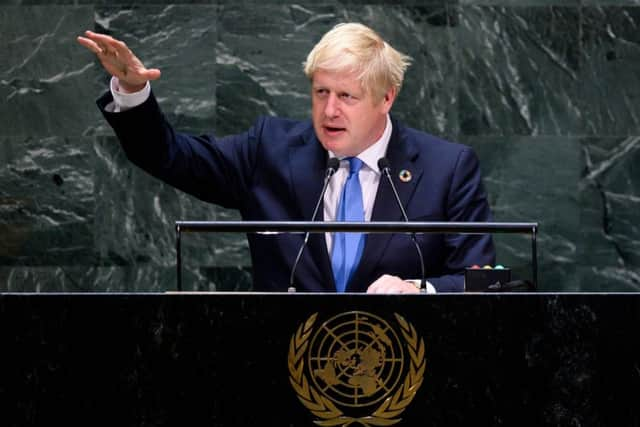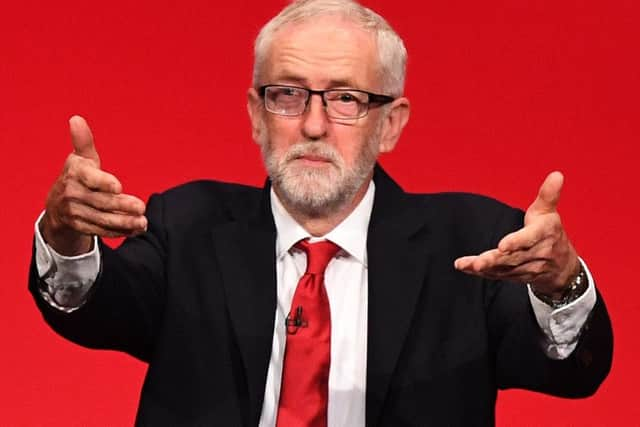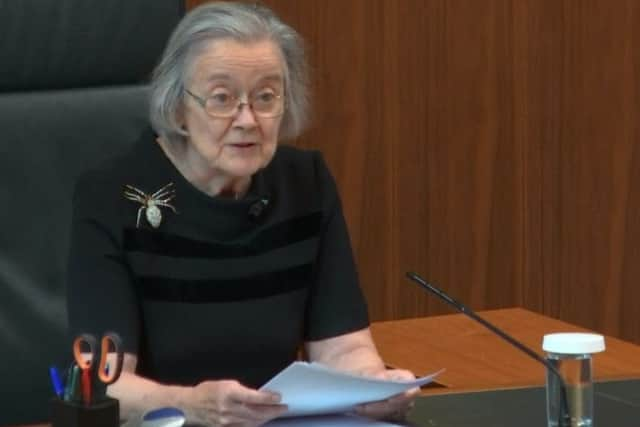Insight: Will Boris Johnson become the UK’s shortest-ever serving Prime Minister?


Even in a month like no other in a year of unprecedented political upheaval, it was a week few will forget any time soon. Though the prime minister may well wish that was the case. The tumult began, as so many frantic political weeks do, with an old-fashioned Sunday newspaper scoop. The story in question, published by the Sunday Times, was an in-depth spread with the enticing headline, “The PM, his glamorous friend, and their global trade trips”.
What followed was a classic scoop by the title’s Insight team, detailing how Johnson failed to declare a series of potential conflicts of interest over a close friendship with an American model turned technology entrepreneur during his time as London mayor.
Advertisement
Hide AdAdvertisement
Hide AdThe woman in question, Jennifer Arcuri, was given a total of £126,000 in public money and privileged access to three official overseas trade missions led by Johnson, the report explained, before noting how sources said the 55-year-old was a regular visitor at Arcuri’s east London flat.


Jeremy Corbyn the Labour leader, seized on the coverage, describing the allegations as a “abuse of power and misuse of public funds,” while Sadiq Khan, the incumbent London mayor, asked officials at City Hall to look into the issue.
The clamour for answers and accountability continued into Monday, rivalled for column inches only by the controversy engulfing Labour over proposals to abolish the job of Tom Watson, right, as deputy leader, and moves by Corbyn to prevent the party from campaigning to remain in the EU at a general election.


Arcuri
As criticism of his conduct intensified, the prime minister perhaps relished the prospect to jet away from a looming scandal after boarding a RAF Voyager to New York – the city of his birth – to attend the United Nations General Assembly.
However, an unwelcome surprise lay it await on board in the form of a group of reporters. They asked him six times about the Arcuri story. Six times he refused to answer them, replying: “I’m going to talk about what we’re doing in the UN.” Once on terra firma stateside, he denied any wrongdoing, but refused to elaborate on his relationship with Arcuri in broadcast interviews.
While travelling over the Atlantic, Johnson was asked about the following day’s Supreme Court ruling on claims he had misled the Queen over his purpose in asking her to approve the five-week suspension of parliament.


Pressed on whether his position would be untenable if the court in effect decided that he had misled the monarch, he struck a defiant tone, insisting: “No, I think the reasons for wanting a Queen’s Speech are extremely good.
“Parliament will have bags of time to scrutinise the deal I hope to do. We must have a Queen’s Speech. We have a big domestic agenda. We have to get on with tackling the priorities of the British people. It is absolutely absurd to be totally fixated on Brexit.”
Advertisement
Hide AdAdvertisement
Hide AdFor the vast majority of political and legal observers, the very prospect of the Supreme Court ruling against the UK government was thought to be little more than an outlying hypothetical The questions of what might happen were dutifully asked of Johnson, but few thought he would be troubled by the court’s verdict. The Arcuri story was extremely damaging, but even for a prime minister already mired in controversy, he seemed on relatively stable ground.
Supreme Court bombshell
Come 10.40am on Tuesday, however, Johnson and the rest of the country were left completely wrong footed when Lady Hale, right, an academic, law reformer and feminist barely two years into her tenure as president of Britain’s highest court, quietly dropped a bombshell.
Spelling out the unanimous judgment from the 11 justices, the 74-year-old, whose diamanté spider brooch pinned to a plain black robe caught the eye, made clear that Johnson’s week was about to take a turn for the worse.
“It is impossible for us to conclude, on the evidence which has been put before us, that there was any reason – let alone a good reason – to advise Her Majesty to prorogue parliament for five weeks,” she said. “We cannot speculate, in the absence of further evidence, upon what such reasons might have been. It follows that the decision was unlawful.”
Some 3,500 miles away, at 5.40am New York time, the prime minister made his way to a hastily convened war room in the city’s Westin Grand Central hotel. Despite the early hour, his aides were already waiting for him. “It’s a constitutional crisis,” was the summary one offered up.
Johnson and his team held a conference call with Attorney General Geoffrey Cox and Robert Buckland, the Lord Chancellor and justice secretary. At its conclusion, it was made clear that the court’s ruling left no wiggle room, with the suspension of parliament deemed null and void.
Johnson’s first public response to the verdict came a few hours later as he visited Hudson Yards in New York. “For the avoidance of doubt, I have the highest respect, of course, for the judiciary and the independence of our courts,’ he said. “But I must say, I strongly disagree with this judgment and we in the UK will not be deterred from getting on and delivering on the will of the people to come out of the EU on October 31 because that is what we were mandated to do.”
Resignation calls
Back home, the calls for Johnson to resign were widespread and instantaneous. First Minister Nicola Sturgeon said the ruling was the most significant constitutional judgment in her lifetime, and that it would be “unthinkable” for the prime minister to remain in office.
Advertisement
Hide AdAdvertisement
Hide Ad“The Supreme Court has found that the prime minister acted unlawfully and that he did so, effectively, to evade scrutiny and accountability,” she said. “He had no good reason for doing so and he did all of this a time of political and constitutional crisis. It is genuinely exceptional and unprecedented.”
Inside the Commons, MPs including former Green Party leader Caroline Lucas and Labour’s Barry Sheerman marked the verdict by sharing selfies on social media of them posing on the chamber’s green leather benches. Each held up a sign. ‘“NOT SILENCED”, it stated.
Outside in Parliament Square, meanwhile, John Bercow donned an especially loud tie featuring what looked like a pattern of party balloons, to address the media. He confirmed the Commons would sit from 11.30am on Wednesday following the judgment.
In Brighton, where the Labour conference had been dominated by party in-fighting, news of the ruling came towards the end of Rebecca Long-Bailey’s keynote address. Even Labour press officers were glued to the live footage of Lady Hale.
Jeremy Corbyn, sensing a golden opportunity, brought forward his own speech by 24 hours. As Labour members chanted “Johnson out,” their leader doubled down in a hastily rewritten address. “Boris Johnson has been found to have misled the country,” Corbyn said. “This unelected prime minister should now resign.”
Amid a flurry of comments about the ruling’s implications for Johnson’s government, one of the most damning and succinct came from another former Conservative premier, Sir John Major. “No prime minister must ever treat the monarch or parliament in this way again.”
‘This parliament is a dead parliament’
For the current incumbent at 10 Downing Street, another gruelling transatlantic red-eye flight beckoned, having cut his New York trip short. Johnson touched down in London mid morning and headed straight to Downing Street. By the time he stood up in the Commons shortly after 6.30pm, there were no signs of jetlag or humility over the Supreme Court’s verdict.
A hint of what lay ahead came Tory MP and Brexiteer, Desmond Swayne, was interviewed by Sky News. He said the court should be abolished, insisting it had “well overstepped the mark”.
Advertisement
Hide AdAdvertisement
Hide AdAfter he and other MPs made their way into the Commons, relatively uneventful business eventually gave way to a vitriolic session which saw bad tempered exchanges fly across the floor as tensions boiled over.
The appearance of Geoffrey Cox at the dispatch box set the tone as he boomed at Rory Stewart, the former Tory leadership contender. “This parliament is a dead parliament,” he insisted. “It should no longer sit. It has no moral right to sit on these green benches.”
The SNP’s Joanna Cherry, who led the Scottish court challenge against prorogation, urged him to publish the legal advice he gave the UK government ahead of the suspension. Cox said he believed the approach had been “both lawful and constitutional”.
Come the prime minister’s turn to take to his feet, emotions ratcheted up. Johnson claimed the electorate was being “held captive by the zombie parliament and zombie opposition”.
As the rhetoric became even more hostile, the SNP’s Ian Blackford accused Johnson of “lying,” “cheating,” and “undermining the rule of law”.
Jo Cox
But the main flashpoint came when Paula Sherriff, right, the Labour MP for Dewsbury, pleaded with the prime minister to refrain from using “dangerous” words like “surrender,” pointing to a memorial to her late colleague, Jo Cox.
“We stand here under the shield of our departed friend, with many of us subjected to death threats and abuse every single day,” Sherriff implored. “They often quote his words, ‘surrender act’, ‘betrayal’, ‘traitor’ and I for one am sick of it.
“We must moderate our language and it has to come from the Prime Minister first. He should be absolutely ashamed of himself.”
Advertisement
Hide AdAdvertisement
Hide AdJohnson’s reply saw MPs across the house draw breath as he dismissed such claims as “humbug”.
He added that the “best way” to honour Cox, who was murdered during the 2016 referendum, was to “get Brexit done”, and he accused his opponents of “synthetic outrage” and “confected indignation.”
Among those watching the tempestuous proceedings was Sturgeon, who posted a sternly worded assessment on Twitter of the prime minister’s performance.
“I feel disgust watching Johnson,” she wrote. “Untrustworthy, craven, not a shred of concern for the consequences of his words or actions. Unfit for office in every sense.”
On Thursday, the fallout from one of the most ill tempered parliamentary debates in living memory continued. Jo Cox’s widower and sister were among those to chastise Johnson, along with his sister, Rachel, who accused him of presiding over a “bully pulpit”.
She told BBC Radio 4’s World At One that her brother’s attack on parliament was a “strongman gambit” and linked it to Dominic Cummings, the prime minister’s chief adviser.
“I think that what we are seeing is an executive that is so keen to deliver Brexit in any shape or form, to get the country out of the EU, to deliver up on that promised land, that they will do anything to justify that end,” she explained.
Toxic culture
The morning after the night before in the Commons, Bercow, right, told MPs that the atmosphere in the chamber had been “worse than any I’ve known in my 22 years in the House,” adding: “On both sides passions were inflamed, angry words uttered, the culture was toxic.”
Advertisement
Hide AdAdvertisement
Hide AdThe Commons he said, “did itself no credit” with the angry scenes, and he called on politicians to “try to treat each other as opponents, not as enemies.”
Johnson, however, declined to apologise for his language about Jo Cox and avoided inflammatory rhetoric, instead attending a meeting of the 1922 Committee of Tory MPs, where he said he would continue to use the phrase “surrender bill” to refer to the act passed to avoid a no-deal Brexit.
As he left the meeting, Johnson declined to respond to journalists asking if he would apologise. Elsewhere at parliament, Cummings was confronted by Labour MP Karl Turner, who said MPs including himself had received further death threats. Cummings told him: “Well, vote for a deal, then.”
By Friday, Amber Rudd added her voice to the criticism surrounding Johnson’s language. The former minister, who resigned the Tory whip this month in protest at Johnson’s policies, said the rhetoric emerging from Downing Street was the “sort of language people think legitimises a more aggressive approach and sometimes violence”.
And Number 10 was left reeling yesterday when it emerged the prime minister could be facing a police inquiry over the claims surrounding Arcuri. The case has been referred to the Independent Office for Police Conduct (IOPC) by the Greater London Authority to decide if a criminal inquiry should happen.
Johnson’s aides branded the move a “politically motivated” attack. Labour’s London mayor Sadiq Khan insisted he had no involvement in the decision.
And as the tumult heightened, the opposition scented blood with the SNP’s Stewart Hosie revealing that a no confidence vote in Johnson could be held early next week.
Although not guaranteed, if successful Johnson would be turfed out of office during his party conference in Manchester – with the ignominy of being the UK’s shortest-ever serving prime minister.
